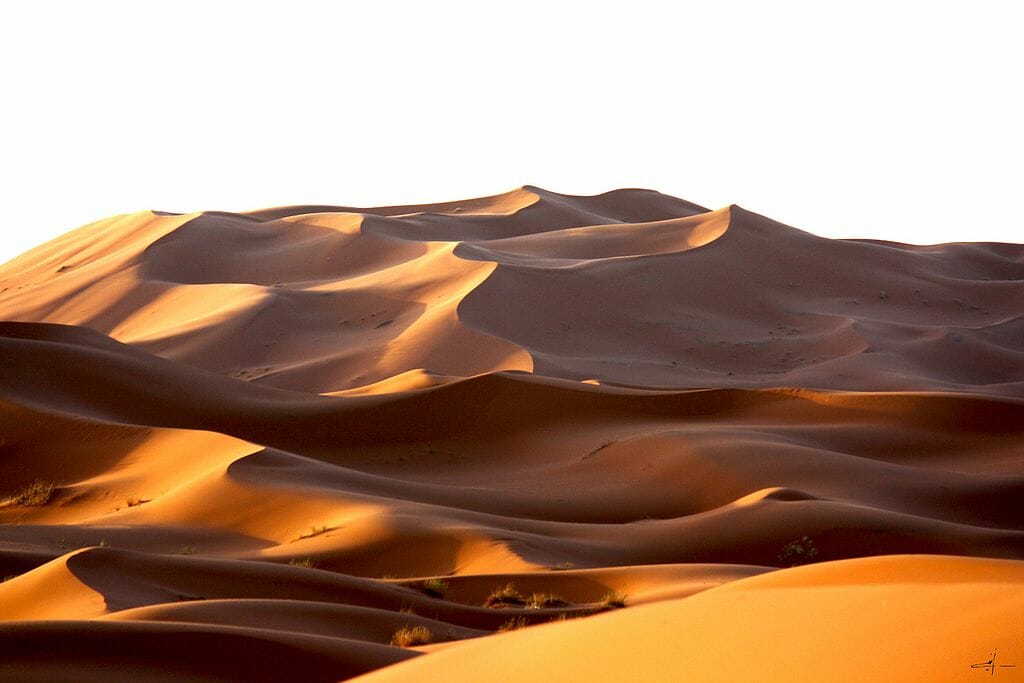Ravaged by Drought, Morocco Faces a Thirsty Future
Despite ambitious plans to use more renewable energy and boost water supplies, the North African nation is being seriously affected by rising temperatures. There are fears that the Sahara Desert will encroach on fertile land. (Med Rizki Zniber / Wikimedia Commons)
There are fears that the Sahara Desert will encroach on fertile land. (Med Rizki Zniber / Wikimedia Commons)
RABAT, Morocco—Morocco, host of the 2016 United Nations conference on climate change and widely seen as one of the more enlightened among North African and Middle Eastern nations on environmental issues, is facing a range of problems associated with global warming, including ever-increasing water shortages.
In recent years drought in what is one of the most water-stressed regions of the world has caused severe damage to the economies of Morocco and neighbouring North African states.
In 2015/2016 a prolonged drought caused Morocco’s production of grain to plummet by more than 70%. In 2017 water shortages became acute and the country’s king, Muhammed VI, issued a decree calling on the faithful at mosques throughout the country to pray for rain.
The droughts have led to social unrest in what till now has been considered one of the more politically stable countries in the region.
Protests over what has been seen as government inaction and incompetence have broken out in several areas; in November last year 15 people were crushed to death as hungry farming families queued for supplies of flour.
A bad situation looks likely to become worse. Latest research by the Brookings Institution in the US predicts that climate change is going to result in average temperatures rising across the North African region by 3°C by 2050.
Rainfall over much of Morocco is anticipated to decline by 10% at the same time as water usage rates rise substantially.
“Higher temperatures, less rainfall and increased land salinity in a country that is already suffering from insufficient water resources do not augur well for the future of agriculture, unless urgent action is taken now,” says the Brookings research.
Desert spread
There is also concern that, along with warming, the Sahara desert could advance northwards, further threatening Morocco’s important agricultural sector, which accounts for 15% of gross domestic product (GDP) and employs 40% of the country’s workforce.
To meet the challenges of climate change and water shortages the government has brought in its Plan Maroc Vert.
This includes an ambitious renewable energy programme, with a target of producing more than 50% of electricity supply by 2030 through a combination of solar and wind power.
Near the town of Ouarzazate, on the edge of the Sahara desert, Morocco is building what’s billed as one of the world’s biggest solar installations.
Improving irrigation
To cope with water shortages the government is also constructing what is likely to be the world’s largest desalination plant – turning seawater into drinking water – near the tourist destination of Agadir on Morocco’s Atlantic coast.
Officials have also promised to spend millions promoting more efficient irrigation systems, and they are encouraging farmers to plant fruit trees rather than water-hungry cereal crops, in an effort to promote water conservation and prevent further soil erosion.
Critics say the government’s approach is half-hearted: they say too much is being spent on mega-projects such as high-speed railways and constructing what will be Africa’s tallest building rather than repairing and expanding basic infrastructure.
Social Watch, an international network of citizens’ organisations fighting poverty around the world, says 35% of Morocco’s water is lost through bad piping. Water is also polluted by industrial and urban waste.
Your support matters…Independent journalism is under threat and overshadowed by heavily funded mainstream media.
You can help level the playing field. Become a member.
Your tax-deductible contribution keeps us digging beneath the headlines to give you thought-provoking, investigative reporting and analysis that unearths what's really happening- without compromise.
Give today to support our courageous, independent journalists.









You need to be a supporter to comment.
There are currently no responses to this article.
Be the first to respond.